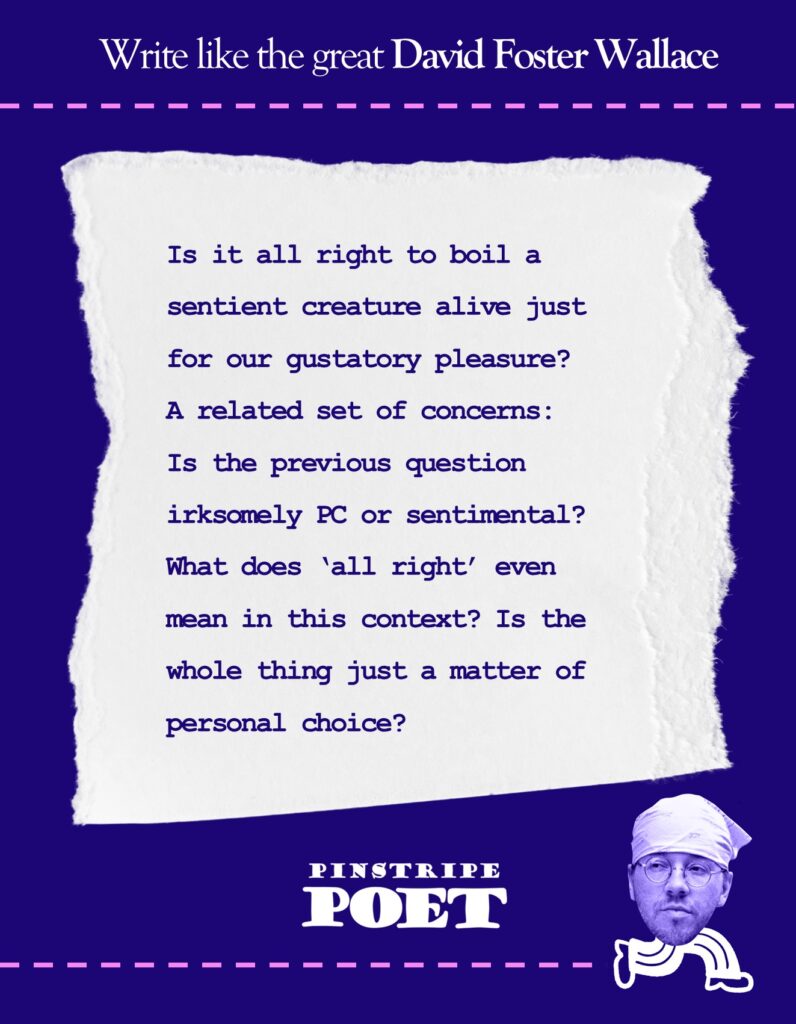
There’s a lot to dig through
I’ve been down a rabbit hole, learning about David Foster Wallace.
The tennis… the footnotes… the depressive episodes and abusive relationships… the posthumous Pulitzer Prize…
My research twisted in on itself. Facts were repeated, underscored. A Sunday afternoon drained away.
I heard about Wallace as a good man who did bad things; and a bad man who did good things. And I was left wondering…
How does a term like ‘rabbit hole’ catch on, anyway?
That’s a subject Wallace could have taken up. The author was also a professor of English who wrote essays about grammar (and managed to get them published in Harper’s).
In his analysis:
A vogue word … becomes trendy because a great deal of listening, talking, and writing for many people takes place below the level of consciousness. It happens very fast. They don’t pay it very much attention, and they’ve heard it a lot. It kind of enters into the nervous system. They get the idea, without it ever being conscious, that this is the good, current, credible way to say this, and they spout it back.
And there it is: Wallace’s curiosity about consciousness. The reason why I return to his writing (and his reality-shifting commencement speech), every few years.
He urged us to pay attention, to gain ‘freedom of choice regarding what to think about’ — even though:
It is unimaginably hard to do this, to stay conscious and alive in the adult world day in and day out.
That’s the other reason to ask him about ‘rabbit holes’ (not literal warrens, but topics you can fall into): there’s a debate to be had.
When you topple into a rabbit hole online are you claiming your freedom to choose what to think about? Or surrendering it?
I’d answer those questions with an unsatisfying ‘Depends’
It depends whether you are actively interrogating the subject, looking at it from different angles, through the lenses of several disciplines, while you examine the motives of your sources and of yourself.
Do all that and you can be an effective rabbit. You can use your sturdy claws to dig into your topic. You can pick a winding path to the bedrock, rather than tumbling down someone else’s algorithmically reinforced route.
David Foster Wallace did some deft digging in Consider The Lobster
The article was commissioned by Gourmet magazine. Published in August 2004, it inspired more correspondence than any other in the magazine’s history — letters like:
What were you thinking when you published that lobster story?
And:
Do you think I read your magazine so you can make me feel uncomfortable about the food I eat?
And:
Please find writers who enjoy their job, their travels, other travels, and food!
Wallace enjoyed his job, alright
It’s just that he thought the purpose of the article was to explain:
… what it was like to attend the 2003 MLF [Maine Lobster Festival], and thus to spend several days in the midst of a great mass of Americans all eating lobster, and thus be more or less impelled to think hard about the lobster and the experience of buying and eating lobster…
And so:
… it turns out there is no honest way to avoid certain moral questions.
Wallace’s commitment to free-ranging thought meant his piece on the festival veered from word-pictures of crowded and pungent marquees into marine biology.
Readers learnt that lobsters are ‘basically giant sea insects’ with decentralised nervous systems and ‘hundreds of thousands of tiny hairs’, which makes them sensitive, despite their hardy armour.
As Wallace wondered whether he can justify causing lobsters pain, the article was thrust into a warren of ethical considerations.
He drew the reader deep into his argument, so they couldn’t recall how the article started, nor see the light of day.
And that’s what made Wallace a great essayist
Another writer would have played by Gourmet‘s rules. They would have delivered a conventional article, peppered with voguish terms.
But Wallace scraped out his own winding tunnel, directed by his conscious (meaning ‘freely-chosen’) thoughts:
I am not trying to bait anyone here — I’m genuinely curious. After all, isn’t being extra aware and attentive and thoughtful about one’s food and its overall context part of what distinguishes a real gourmet?
He expected readers to wander down his rabbit hole (the entranceway was tempting), become trapped, and to either continue his inquiry or scrabble their way out. He wanted effort on both sides.
Anything to make them think.
Aidan Clifford writes for Pinstripe Poets – artists who love their day jobs. This post is part of a series called ‘Write like the Greats’. See the rest here.


